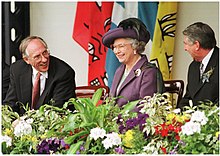Donald Dewar
Donald Dewar | |
|---|---|
 Donald Dewar's official portrait | |
| First Minister of Scotland | |
| In office 17 May 1999 – 11 October 2000 | |
| Monarch | Elizabeth II |
| Deputy | Jim Wallace |
| Preceded by | Office established |
| Succeeded by | Henry McLeish |
| Leader of the Scottish Labour Party | |
| In office 7 May 1999 – 11 October 2000 | |
| UK party leader | Tony Blair |
| Preceded by | Position established |
| Succeeded by | Henry McLeish |
| Secretary of State for Scotland | |
| In office 2 May 1997 – 17 May 1999 | |
| Prime Minister | Tony Blair |
| Preceded by | Michael Forsyth |
| Personal details | |
| Born | Donald Campbell Dewar 21 August 1937 Glasgow, Scotland |
| Died | 11 October 2000 (aged 63) Edinburgh, Scotland |
| Cause of death | Cerebral hemorrhage |
| Political party | Scottish Labour |
| Spouse(s) |
Alison McNair
(m. 1964; div. 1973) |
| Children | 2 |
| Education | University of Glasgow |
| Signature | |
Donald Campbell Dewar (21 August 1937 – 11 October 2000) was the first First Minister of Scotland from 1999 until his death in 2000. He was the first person to hold the position of First Minister following the establishment of the Scottish Parliament in 1999.
Early life
[change | change source]Dewar was born and raised in Glasgow.
In government
[change | change source]After the 1997 General Election, Dewar was in a position which John Smith (leader of the Labour Party, 1992-1994 and a good friend of Dewar) would never have thought possible. He was able to start the process to split Scotland from the United Kingdom, and worked endlessly on creating the Scotland Act, popularly known as Smith's "unfinished business". When ratified, this was to give Scotland its first Parliament for nearly 300 years.
First Minister of Scotland
[change | change source]The first elections to the Scottish Parliament were held on 6 May 1999, with Dewar leading the Scottish Labour Party against their main opponents, the SNP under Alex Salmond. He was elected as the MSP for Glasgow Anniesland. Although Scottish Labour won the most seats, they did not have a majority in Parliament to allow them to form an Executive without the help of a smaller party. A deal was agreed with the Scottish Liberal Democrats to work together, with Dewar agreeing to their demand for the abolition of up-front tuition fees for university students.[1]
On 13 May, Dewar was nominated as First Minister, and was officially appointed by the Queen on 17 May at a ceremony in the Palace of Holyroodhouse. He later travelled to the Court of Session to be sworn in by the Lord President and receive the Great Seal of Scotland.[2]
On 16 June, Dewar set out the legislative programme for the Executive which included: an Education bill to improve standards in Scottish schools; land reform to give right of access to the countryside, a bill to abolish the feudal system of land tenure; and a bill to establish National Parks in Scotland.[3]
Death and funeral
[change | change source]In April 2000, Dewar was admitted to hospital for tests on his heart, following a previous test where a minor irregularity was discovered.[4] In May 2000, he later had surgery to repair a leaking heart valve, and was forced to take a three month break from Parliament, with Deputy First Minister, Jim Wallace taking over as Acting First Minister.[5] He returned to work on 14 August 2000.[6]
Dewar dealt with the exams results fiasco and the lorry drivers strike, and attended the Labour party conference in Brighton in September, but at the end of September told the historian Tom Devine in Dublin that if there was no surge of the energy of old, he would have to reappraise the situation within a few months time.[7]

On 10 October 2000 around lunchtime, Dewar sustained a fall. He seemed fine at first but later that day suffered a massive brain hemorrhage which was possibly triggered by the medication he was taking after the heart surgery. Donald Dewar died the following day, at 12.18pm, in Edinburgh's Western General Hospital. He was 63 years old.
Dewar's funeral service was held at Glasgow Cathedral, amid scenes of mourning unknown for a politician in Scotland's largest city. He was cremated on 18 October 2000, and his ashes were scattered at Lochgilphead.
Although he has become something of a political legend, Donald would have abhorred any attempt to turn him into some kind of secular saint. He would have been horrified at a Diana-style out-pouring of synthetic grief at his untimely death. -- Iain MacWhirter, Sunday Herald, 15 October 2000.
References
[change | change source]- ↑ "PR deal will end councils stranglehold", The Guardian
- ↑ "UK Politics- Dewar appointed as first minister", BBC News, 17 May 1999
- ↑ Dewar's statement to Parliament, BBC News
- ↑ "Dewar undergoes heart tests", BBC News, 25 April 2000
- ↑ "Dewar takes post-op steps", BBC News, 11 May 2000
- ↑ "First Minister returns to the fray", BBC News, 14 August 2000
- ↑ "Donald Dewar", Electronic Scotland, October 2000
- 1937 births
- 2000 deaths
- Scottish lawyers
- Deaths from cerebral hemorrhage
- First Ministers of Scotland
- Labour Party (UK) MPs
- Members of the British House of Commons for Scottish constituencies
- Politicians from Glasgow
- Members of the Privy Council of the United Kingdom
- Labour Party (UK) members of the Scottish Parliament
- Secretaries of State of the United Kingdom
- UK MPs 1966–1970
- UK MPs 1974–1979
- UK MPs 1979–1983
- UK MPs 1983–1987
- UK MPs 1987–1992
- UK MPs 1992–1997
- UK MPs 1997–2001
